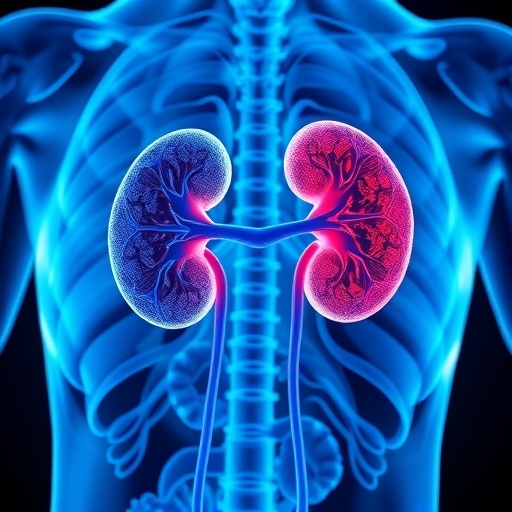A groundbreaking study from the University of Michigan Health Rogel Cancer Center and its Department of Pathology sheds new light on the diagnosis of renal cell carcinoma (RCC), specifically the microphthalmia-associated transcription factor (MiTF) family altered RCC. Renal cell carcinoma, a malignancy originating in the kidney, presents diagnostic challenges, particularly within the MiTF subtype, which is often identified through conventional genetic testing methods. This latest research highlights an overexpression of the TRIM63 gene, unveiling a novel pathway to identifying mutations that standard diagnostic practices might overlook, thereby expanding treatment possibilities for affected patients.
Current diagnostic techniques for MiTF RCC heavily rely on fluorescent in situ hybridization (FISH) assays. This method employs fluorescent probes targeted to specific DNA sequences, particularly focusing on TFE3 and TFEB gene rearrangements known to drive oncogenesis in this cancer subtype. FISH testing serves as the gold standard in clinical settings, affording pathologists a direct visualization of chromosomal abnormalities within tumor cells. While FISH is invaluable for confirming MiTF RCC, it is not without limitations; false-negative results can arise due to cryptic or complex rearrangements that evade detection, potentially leading to underdiagnosis and missed opportunities for tailored therapies.
Rohit Mehra, M.D., the Godfrey Dorr Stobbe Research Professor of Translational Pathology, spearheaded the investigation after observing an intriguing pattern. Some renal cell carcinoma tumors that tested negative by FISH assays nonetheless exhibited morphological characteristics strongly suggestive of MiTF RCC. This paradox prompted a deeper inquiry into the alternative biomarkers and genetic expressions that might better capture the heterogeneity of these tumors. Collaborating with the Michigan Center for Translational Pathology, Dr. Mehra’s team turned their focus to TRIM63, a gene previously associated with MiTF family altered RCC but not systematically investigated in FISH-negative cases.
Their research revealed a compelling link: tumors that were FISH negative yet overexpressed TRIM63 frequently harbored MiTF-associated genetic alterations undetected by conventional assays. TRIM63, known to function in protein ubiquitination and degradation pathways, may serve as a sensitive biomarker for identifying elusive gene rearrangements underpinning tumorigenesis. By deploying advanced genomic techniques alongside immunohistochemical analysis, the team uncovered that approximately 70% of these TRIM63-positive but FISH-negative cases indeed possessed MiTF gene fusions, underscoring the diagnostic blind spots of relying solely on FISH.
This finding has considerable clinical significance. The realization that TRIM63 immunohistochemistry can complement FISH assays introduces a new diagnostic paradigm, enhancing precision in classifying renal tumors with ambiguous genetic profiles. Identifying MiTF alterations is critical, as these tumors often display aggressive behavior and may benefit from targeted therapies or enrollment in clinical trials tailored to their molecular drivers. Expanding the diagnostic toolkit to include TRIM63 assessment could, therefore, unlock a subset of patients previously deemed ineligible for such interventions based on incomplete genetic information.
The methodological rigor of the study, published in the esteemed journal Modern Pathology, entailed comprehensive genomic analyses, including next-generation sequencing and RNA profiling, to validate TRIM63’s role as a diagnostic marker. This integrative approach strengthens the evidence base and ensures that the conclusions drawn are grounded in multi-layered molecular data. The research also demonstrated that the overexpression of TRIM63 is not merely correlative but likely reflective of underlying genomic aberrations affecting the MiTF transcriptional network.
Moreover, the study builds upon prior pioneering efforts by Jeffrey Myers, M.D., and Arul Chinnaiyan, M.D., Ph.D., who conceptualized complex genitourinary esoteric clinical assays to unravel molecular intricacies of urologic cancers. Their foundational work paved the way for such nuanced investigations that blend morphology, immunohistochemistry, and genomic science to redefine diagnostic boundaries. The University of Michigan’s multidisciplinary collaboration exemplifies how translational pathology bridges basic research and clinical application, ultimately improving patient outcomes.
The implications of these findings extend beyond immediate diagnostic refinement. They suggest a broader need to reconsider reliance on traditional assays that may miss cryptic genetic changes in heterogeneous tumors. This study underscores the evolving landscape of precision medicine, where molecular profiling increasingly informs treatment decisions. As clinical oncology moves toward individualized therapeutic strategies, the capacity to accurately define tumor biology at the genetic level becomes paramount.
Given that TRIM63 has been integrated into clinical biomarker panels at U-M for over two years, this study’s results validate and encourage wider adoption of such testing in other institutions. The prospect of reducing false negatives in MiTF RCC diagnosis is a significant stride toward better patient stratification and management. Future research will likely explore the mechanistic aspects of TRIM63 in tumor progression, potentially unveiling new therapeutic targets.
In summary, the work from the University of Michigan reveals that the overexpression of TRIM63 gene marks a critical biomarker capable of identifying MiTF family altered renal cell carcinomas undetected by conventional FISH assays. This discovery enhances the diagnostic arsenal, offering hope for more accurate disease classification and expanded treatment modalities for patients grappling with this aggressive form of kidney cancer.
Subject of Research: Renal Cell Carcinoma, Microphthalmia-Associated Transcription Factor Family Altered RCC, TRIM63 gene expression, Diagnostic Biomarkers
Article Title: TRIM63 Overexpression in FISH-Negative MiTF Family Altered Renal Cell Carcinoma (MiTF RCC)
News Publication Date: 25-Aug-2025
Web References:
https://doi.org/10.1016/j.modpat.2025.100873
https://www.uofmhealth.org/our-care/specialty-centers-hospitals/rogel-cancer-center
https://www.pathology.med.umich.edu/
https://pubmed.ncbi.nlm.nih.gov/40865922/
References:
Mehra R., Mannan R., Chen Y-B., Wang X., Zhan Y., Hosseini N., Sangoi A.R., et al. (2025). TRIM63 Overexpression in FISH-Negative MiTF Family Altered Renal Cell Carcinoma (MiTF RCC). Modern Pathology. https://doi.org/10.1016/j.modpat.2025.100873
Keywords: Kidney cancer, Renal cell carcinoma, MiTF RCC, TRIM63, FISH assay, Gene rearrangement, Molecular diagnostics, Biomarker, Precision medicine
Tags: chromosomal abnormalities in tumor cellsFISH assay limitations in oncologygenetic testing for renal cancerkidney cancer diagnosis advancementsmicrophthalmia-associated transcription factor RCCMiTF subtype cancer identificationnovel diagnostic pathways for RCCpersonalized treatment for kidney cancerrenal cell carcinoma researchtranslational research in oncologyTRIM63 gene overexpressionUniversity of Michigan Health cancer studies





